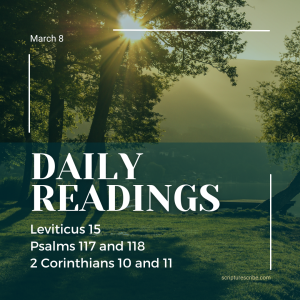
Saturday Jun 07, 2025
Thoughts on the Bible reading (Judges 4 and 5, Isaiah 32, James 2) for June 8th
In these chapters we meet two heroines through whom God delivered His people- Deborah and Jael. Deborah means bee and she brought sweetness for Israel and a destructive sting for Sisera and his host. She inspired Barak, whose name means lightning, to attack from the heights of Mount Tabor – a position from which escape was impossible with 10,000 men who trusted in God to deliver them. Barak was hesitant in allowing himself to rise to the heights of faith unless strongly encouraged by a mother in Israel, a prophetess of immense faith. Many a brother reluctantly takes on a task only because a wonderful woman stands up to support him. Barak placed his life and the 10,000 courageous men of Naphtali to place themselves at Yahweh’s disposal. Let us too, despite our shortcomings, make ourselves available to do our Sovereign’s will. When we do we will like Barak find strength in our time of need and the evidence of the Almighty energetically working in concert with His children. Despite our weaknesses the LORD uses His instruments to do His work. Sisera fled, only for the mighty general to fall victim to a courageous and faithful woman. Sisera fell victim to an insignificant tent peg. The praise and thanksgiving to God is celebrated in Deborah’s song. Deborah describes the desperate and vulnerable state in which Israel found themselves. But the situation was changed by women and men who overcame by their faith and helped the Almighty to deliver His people. The prophetess also calls upon the LORD to judge those who apathetically fled the fight. Let us never underestimate the power of faithful women to inspire courageous activity in the ecclesia of the Living God.
Isaiah 32 is yet another encouraging vision which lifts the mind of the troubled believer from the disturbances of the present and encourages us all to hang on until the Lord’s coming. When our Lord Jesus reigns as the righteous king from Zion and his princes execute justice in the earth the faithful will flourish. Verses 2-8 tell of the responses of the downtrodden and the contempt in which the vile and oppressors will be held. Verses 9-14 warn of the LORD’s judgements on the proud and complacent women of Zion. These judgments will bring the contemptuous low and prepare the faithful remnant for the blessings Messiah will bring.
Verses 15-20 describe Yahweh’s spirit being poured upon His people.The Promised Land will abound with fruit. The extremities of the kingdom will experience righteousness and justice. Verses 17 ESV reads: “And the effect of righteousness will be peace, and the result of righteousness, quietness and trust for ever”. Note that there can be no peace without righteousness. When the Lord Jesus was born the angels sang: “Glory to God in the highest and earth peace to men of good will”. The principle is explained in
James 3:13-18. Read these verses slowly aloud and pause and ponder there meaning for you. And so the final three verses of Isaiah 32 give us a vision to cheer us and encourage us to strive to be with our Lord in his glorious kingdom.
James 2 was a hotly debated chapter at the time of the Reformation. Martin Luther totally misunderstood the message of James 2 and declared the letter of James to be, “A straw letter”. Luther was wrong. James argues that atonement is not based on faith alone; but upon a faith that actively works, being energised by love to purify our hearts (Galatians 5:1-6). Paul and James do not present conflicting arguments, but they are in fact complementary – John Thomas, a Christadelphian writer wrote in ‘Elpis Israel’ (published in 1850), “Abraham the sinner was justified by faith, but Abraham the saint was justified by his works”. Ephesians 2:4-10 expresses the truth that works are the response of the LORD’s children performed in gratitude to God’s grace. Verses 1-13 of James 2 deal with the sin of partiality. This is a sin to which we are all prone. We are all equal in God’s eyes. James says the prominent, the posers, the powerful are shown preference. How evil is this! The Bible stresses the need to look after the poor and the vulnerable. Chapter 1 ended on this note. How magnificent and majestic are the words of verse 5 – read slowly, pause and ponder. We must modify our attitudes and behaviours if we are to be the children of our Father. James declared that the very ones to whom you are partial are your persecutors and oppressors. God’s royal law is the law of Love. It is Royal as it reigns supreme above all other laws. It cannot be measured, nor can it be legislated. And yet it will be the basis of our being judged by our Lord Jesus Christ at his coming (compare Romans 13:8-10). Mercy is received when mercy is the basis of our dealings with others. From verses 14-26 the writer establishes, from the Scriptures, the uselessness of a faith without without works. James gives the example of sensitivity to spiritual needs, yet a total insensitivity to life’s essentials – how incongruous, and yet this so often happens. Faith cannot be demonstrated in a vacuum. Even demented people can show a fearful, but pointless faith (belief). The evidence of faith is seen in action (the writer to the Hebrews showed this in the 11th chapter). Abraham and Rahab are the evidence of James’ argument. Faith without works is as useful as a corpse without breath.
No comments yet. Be the first to say something!